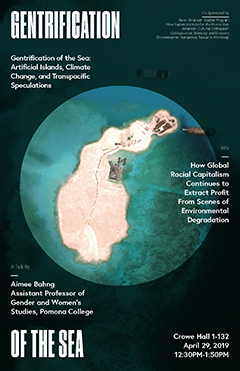Past Events - Environmental Humanities Research Workshop
2022-2023 Events
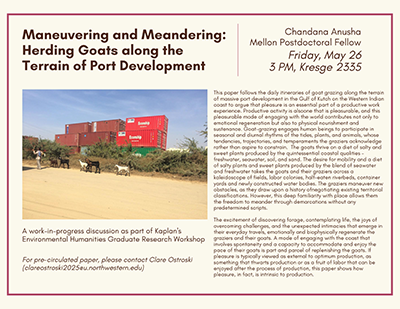 Chandana Anusha (Postdoctoral Fellow in Environment, Race, and Ethnicity, Kaplan Humanities Institute)
Chandana Anusha (Postdoctoral Fellow in Environment, Race, and Ethnicity, Kaplan Humanities Institute)
May 26, 2023
3:00 pm
Kresge Hall 2335
Ekin Kurtic (Keyman Modern Turkish Studies Postdoctoral Fellow, Middle East and North African Studies Program)—Work-in-progress session
May 18, 2023
2:00 pm
Kresge Hall 2335
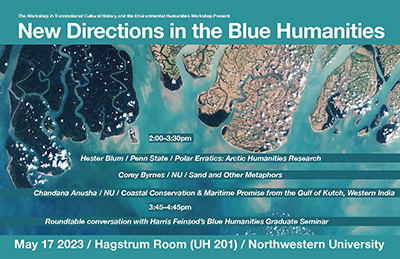 New Directions in the Blue Humanities
New Directions in the Blue Humanities
May 17, 2023
2:00 - 5:00 pm
University Hall 201 (Hagstrum Room)
James Schwoch (MTS) — Teaching Environment and Climate at Northwestern
May 9, 2023
3:00 pm
Kresge Hall 2435
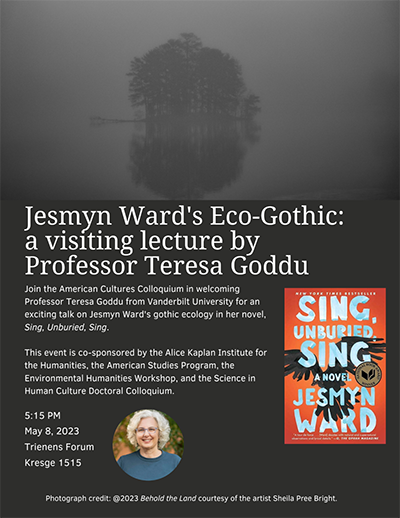 Jesmyn Ward's Eco-Gothic: A Visiting Lecture by Professor Teresa Goddu
Jesmyn Ward's Eco-Gothic: A Visiting Lecture by Professor Teresa Goddu
May 8, 2023
5:15 pm
Kresge Hall 1515 (Trienens Forum)
Co-presented by the American Cultures Colloquium, American Studies, Science in Human Culture Doctoral Colloquium, and the Environmental Humanities Research Workshop.
Teresa Goddu (Vanderbilt University) will give a talk on Jesmyn Ward's gothic ecology in Ward's recent novel, Sing, Unburied, Sing. An informal Q&A session for graduate students with Professor Goddu will take place at 4:30 pm, prior to the start of her talk. This will focus more on Goddu's work in developing the sustainability studies minor at her university, environmental humanities pedagogy, and her experience working in an increasingly interdisciplinary subject matter.
Clare Ostroski — Animal Studies and Posthumanism: Problems and Ideas for Bridging Disciplines in the Environmental Humanities
April 17, 2023
3:00 pm
Kresge Hall #2331
Clare Ostroski (Screen Cultures) will explore alternative ways to think about technology and environment together, focusing on the intersections of animal studies, nonhumanness, posthumanism, and cyborgs (complete description below).
As seen in our entanglements with microplastics and nuclear toxicity, human and nonhuman matter necessarily and continually collide with one another. My dissertation explores how media history and theory might help us imagine more radical futurities in those conditions. Using feminist, Black, and queer materialisms, environmental anthropology, and Indigenous cosmologies, I look at dead animals in cinema, taxidermied and plastinated bodies in museums, animatronic robots in theme parks, and all kinds of organisms changed, or in Donna Haraway’s words, “fractured,” by radioactivity.
In this talk, I hope to discuss some disciplinary challenges and solutions I have encountered. Some questions I hope to work through with the Environmental Humanities Research Workshop are:
- In what ways do “media” and “environment” interact beyond media infrastructure or production and their waste or pollution?
- How can we best invoke Indigenous animisms when analyzing inorganic objects and industrial histories?
- What do we mean by “environment” with respect to our present industrial, digital, and technological conditions?
Phoenix Gonzalez — Ecological Disaster and Ecofeminism in Three Medieval Noah Plays
April 13, 2023
12:00 pm
Via Zoom: https://northwestern.zoom.us/j/99334258361
Work in progress session with Phoenix Gonzalez (Interdisciplinary PhD in Theatre and Drama). The biblical story of Noah’s Flood was well known in late medieval English iconography, appearing frequently in striking stained glass windows and elaborate, emotional manuscript illuminations. It was also one of the few Old Testament stories to be found in three extant late medieval English Cycle Plays—Chester, York, and Towneley. Performed—or intended to be performed—on the occasion of Corpus Christi in civic productions, the late medieval Noah plays in these three Cycles dramatized the events of the biblical Flood story and added medieval details, most notably the trenchant, truculent character of Uxor Noe and her female companions, or Gossips. Instead of following God’s command to board the ark with her husband, like the animals do in two-by-two formation, Uxor argues that her place is on land with her Good Gossips, whom she is willing to follow to her death. Layered on top of the recusant choice to disobey God’s command is Uxor and her Gossips’ willingness to defy social norms, exemplified especially in the defiant drinking song they sing towards the end of the Chester play. In their resistance and refusal, Uxor and her Gossips stand together as an antagonistic force for change in the midst of rising floodwaters around them.
The importance of this story in the medieval biblical narrative and its cosmic proportions suggest several questions: What sort of ecological framework did the Noah pageants put forth for their medieval audiences? What image of nature would an audience have walked away with? And how did the plays conceive of a woman’s role in the midst of this ecological disaster? Through a comparative, ecofeminist look at Uxor and her Gossips across these three plays, this essay argues that the plays enacted a redefinition of human relationships, thereby reinterpreting what it could mean to interact with the wildness of God and nature, as represented by the Flood.
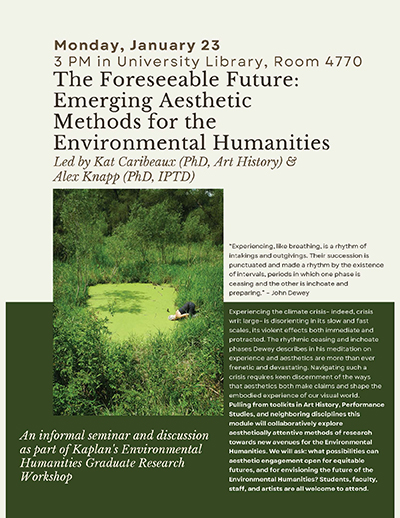 The Foreseeable Future: Emerging Aesthetic Methods for the Environmental Humanities
The Foreseeable Future: Emerging Aesthetic Methods for the Environmental Humanities
Kat Caribeaux (PhD, Art History) and Alex Knapp (PhD, IPTD)
January 23, 2023
3:00 - 4:00 pm
University Library, Room 4770
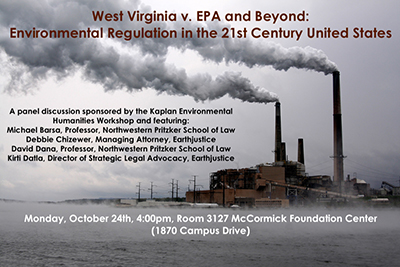 West Virginia v. EPA and Beyond:
West Virginia v. EPA and Beyond:
Environmental Regulation in the 21st Century United States
October 24, 2022
4:00 pm
McCormick Foundation Center #3127
(1870 Campus Drive)
A panel discussion featuring:
- Michael Barsa, Professor, Northwestern Pritzker School of Law
- Debbie Chizewer, Managing Attorney, Earthjustice
- David Dana, Professor, Northwestern Pritzker School of Law
- Kirti Datla, Director of Strategic Legal Advocacy, Earthjustice
This past summer the Supreme Court issued a 6-3 ruling in West Virginia v. EPA, which some legal observers called "one of the most significant environmental rulings the court has ever reached." If you've followed the story you might still be wondering what the EPA can and can't do, what the implications are for U.S. climate policy, and what terms like "major questions doctrine" and "Chevron deference" actually mean. Please join us on October 24th at 4:00 pm in 3127 McCormick Foundation Center for answers to all these questions and more! Our distinguished panel of legal experts will explain the ruling and its likely consequences for our current political moment and for many years to come.
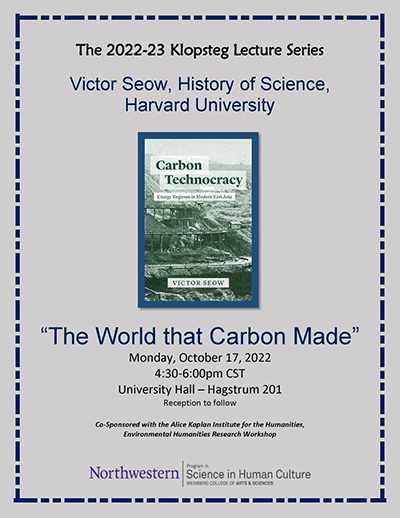 Victor Seow — The World That Carbon Made
Victor Seow — The World That Carbon Made
October 17, 2022
4:30 pm
University Hall #201
Co-presented by the Science in Human Culture Klopsteg Lecture Series.
In this talk, historian of science and technology Victor Seow will be introducing his new book, Carbon Technocracy: Energy Regimes in Modern East Asia, which uses the history of East Asia’s onetime largest coal mine—the Fushun colliery—to examine the rise of fossil-fueled developmentalism in the region and, more broadly, the interplay between energy and power in the industrial modern age.
2020-2021 Events
The Environmental Humanities Podcast
Hosted by Zeynep Oguz, the Environmental Humanities Podcast Series streams on Soundcloud at https://soundcloud.com/environmentalhumanities.
Fall 2020
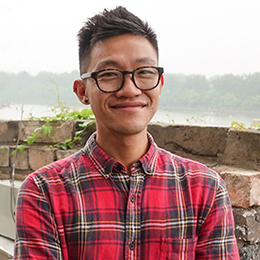 September 27, 2020 (publication date)
September 27, 2020 (publication date)
Environmental Humanities Podcast Episode #1
Sand, dust, and sandstorms in China - Jerry Zee
Featuring:
Jerry Zee, Princeton Environmental Institute and the Princeton University Department of Anthropology
Corey Byrnes, Asian Languages and Cultures and Comparative Literary Studies, Northwestern
Zeynep Oguz (Host), Kaplan Humanities Institute and Department of Anthropology, Northwestern
On Soundcloud:
https://soundcloud.com/environmentalhumanities/jerry-zee-on-sand-dust-and-sandstorms-in-china
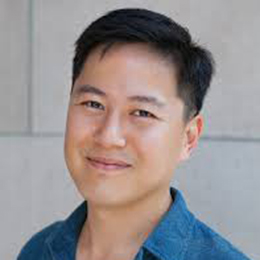 October 27, 2020
October 27, 2020
4:00 - 5:00 pm
via Zoom
Climate Lyricism
Min Hyoung Song, English and Asian American Studies, Boston College
Do you get overwhelmed thinking about climate change? One reason might be because you feel powerless to do anything about it. Certainly, a focus on feeling powerless is very much a part of recent environmental humanities discussions about distributed agency and human- nonhuman entanglements. This talk seeks to connect such discussions with the feeling of powerlessness, and offer some thoughts about how contemporary literature can help you to engage in a practice of sustained attention to climate change.
Co-presented by the Comparative Literary Studies Program.
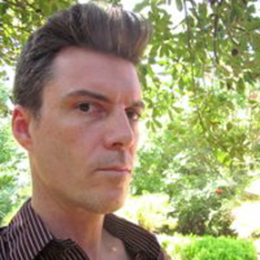 November 10, 2020 (publication date)
November 10, 2020 (publication date)
Environmental Humanities Podcast Episode #2
Reclaiming the energy commons - Ashley Dawson
Featuring:
Ashley Dawson, Author, Activist, and Professor of English at the Graduate Center and the College of Staten Island, CUNY
Zeynep Oguz (Host), Kaplan Humanities Institute and Department of Anthropology, Northwestern
On Soundcloud:
https://soundcloud.com/environmentalhumanities/ashley-dawson
Winter 2021
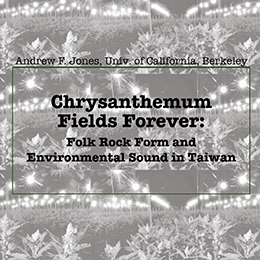
February 16, 2021
3:30 - 4:30 pm CST
via Zoom - Click here to register
Chrysanthemum Fields Forever: Folk Rock Form and Environmental Sound in Taiwan
Andrew F. Jones, East Asian Languages and Cultures, University of California, Berkeley
The Taiwanese folk-rock music of Lin Sheng-xiang and Chung Yung-feng emerged from the social movements of post-martial law Taiwan, and in particular from local environmental struggles against the effort of the developmental KMT party-state to construct a dam in their hometown. Lin and Chung’s early work with the Labor Exchange Band self-consciously advocated a return to rural roots, local idioms, and to the land. This talk focuses in particular on Lin and Chung’s appropriation of the long-playing record (LP) as a musical, narrative, material, and social form and as a means of organizing, historicizing, and giving voice to local subjectivities, political struggles, and environmental sounds. In their studio-craft and recording practices, Lin and Chung have constructed a radically open and participatory model of folk musical expression, predicated on the auto-ethnographic construction of a rural soundscape.
Co-presented by the Environmental Humanities Workshop and the Program in Comparative Literary Studies.
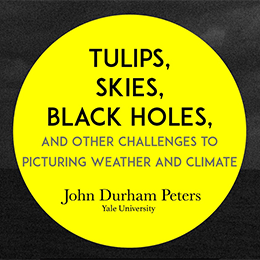 February 19, 2021
February 19, 2021
12:00 - 1:20 pm CST
via Zoom - Click here to register
Tulips, Skies, Black Holes, and Other Challenges to Picturing Weather and Climate
John Durham Peters, English and Film & Media Studies, Yale University
Professor Peters is the author of several books, including Speaking into the Air: A History of the Idea of Communication (1999), The Marvelous Clouds: Toward a Philosophy of Elemental Media (2015), and most recently, Promiscuous Knowledge: Information, Image, and Other Truth Games in History (2020), with the late Kenneth Cmiel (all published by the University of Chicago Press). He is working on a media history of weather.
Pre-talk Coffee with Grad Students
Professor Peters is also holding a pre-talk “coffee” for graduate students on Friday, February 19 from 10:30-11:30 am CST. Click here to register.
Presented by the Center for Global Culture and Communication.
2019-2020 Events
Fall 2019
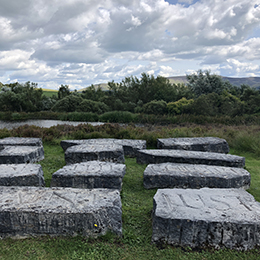 October 8, 2019
October 8, 2019
12:00 - 1:30 pm
Kresge Hall #2350 (Kaplan Institute)
Topology and the Topos: Situated Poetics in Ian Hamilton Finlay’s Little Sparta
Jayme Collins, PhD student in English and Franke Graduate Fellow of the Kaplan Humanities Institute
Brown bag workshop (bring your own lunch!)
More details: Click title link above.
RSVP for pre-circulated materials to Adam Syvertsen: adamsyvertsen2025@u.northwestern.edu
Winter 2020
January 21, 2020
4:00 - 5:30pm
Kresge Hall #2380
The Brazilian Backlands Reconstructed: Environmental Mimesis in João Guimarães Rosa’s The Devil to Pay in the Backlands
Victoria Saramago, Romance Languages and Literatures, University of Chicago
Few Brazilian novels have been as influential as João Guimarães Rosa’s Grande sertão: veredas (1956; trans. The Devil to Pay in the Backlands, 1963). In many senses, Grande sertão: veredas epitomizes a long tradition of intellectual and literary reflection on the country’s backlands, reconfigured in this novel via Modernism and existentialism, but remaining deeply grounded in the specificities of local environments and ways of life. This talk investigates some fundamental ways in which this novel has functioned as a social and environmental agent by inspiring a number of conservationist projects in the Brazilian state of Minas Gerais and setting symbolic standards for what referential reality should be. Drawing on theories of fiction and artistic agency, this talk seeks to explore key aspects of the convergence between fiction and environmental conservation. It does so by analyzing projects that explicitly attempt to recreate and evoke the novel’s settings in the Brazilian backlands: the Grande Sertão Veredas National Park, the Guimarães Rosa Touristic Circuit, and the Manuelzão Project.
More details: Click title link above.
February 11, 2020
4:00 - 5:30pm
Kresge Hall #2350 (Kaplan Institute)
Toxic Matter in Translation: Chinese Waste Politics and the Challenge to Recycling
Adam Liebman, Mount Vernon Society of Fellows Postdoctoral Scholar, George Washington University
In 2018 China banned imports of “foreign garbage,” profoundly disrupting recycling programs around the world and sending a message that what westerners consider a virtuous environmental practice often merely displaces pollution. Chinese waste politics further challenges notions of recycling by drawing attention to the environmental injustice implications of what I call “toxic matter in translation”—harmful substances cycling through biosocial processes that are unevenly distributed, recognized, and contested across political and epistemological boundaries. This talk illustrates the process of constructing and contesting material/linguistic equivalents with three ethnographic vignettes from a southwestern Chinese city. The first documents contestations over toxic “swill pigs” that depart from celebrations of the role of pigs in recycling soil nutrients during the Mao era; the second centers on the struggles of rural migrant scrap traders considered polluting by the state; and the third highlights how one entrepreneur’s efforts to build western-style recycling systems have been undermined by the anti-foreign waste movement.
More details: Click title link above.
Spring 2020
CANCELLED May 22, 2020
8:30 am - 7:00pm
Location TBD
We are sorry, but this event has been cancelled due to the COVID-19 pandemic. We wish everyone good health and community strength.
Symposium on Oceans and the Blue Humanities
The Environmental Humanities Research Workshop and doctoral candidate Bonnie Etherington (English/Northwestern) will host a day-long symposium on oceans and the blue humanities on May 22, 2020. The schedule is still in the works but an exceptional lineup of confirmed speakers to date includes:
Elizabeth DeLoughrey, English, UCLA
Vicente Diaz, American Indian Studies, Minnesota
Elizabeth Hennessey, History, Wisconsin
Sarah Dimick, Environmental Studies/English, Lafayette
Harris Feinsod, English, Northwestern
2018-2019 Events
Spring 2019
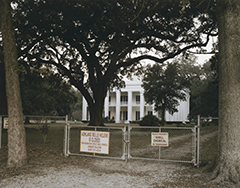 April 8, 2019
April 8, 2019
Sara Černe
Mississippi Palimpsests and Industrial Wastelands
Workshop: 12:00 - 1:30pm; Kresge Hall #2350 (Kaplan Institute)
Details: Click title link above
Sara Černe is a PhD student in English at Northwestern, and a Franke Graduate Fellow of the Kaplan Humanities Institute.
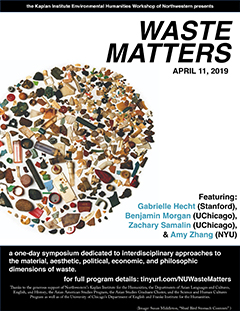 April 11, 2019
April 11, 2019
Waste Matters Symposium
Featuring Gabrielle Hecht (Stanford), Benjamin Morgan (UChicago), Zachary Samalin (UChicago), and Amy Zhang (NYU).
Click here for full symposium details.
 April 17, 2019
April 17, 2019
Heather Houser
A New Natural History through Data Visualization
Public talk: 5:00 - 6:30pm; University Hall #201
Details: Click title link above
Brownbag lunch discussion with Professor Houser for graduate students:
12:30 to 1:30pm; Kresge #2350—Bring your own lunch!
Please RSVP to Sarah Dimick at sarah.dimick@northwestern.edu
Heather Houser is Associate Professor of English and co-director of Planet Texas 2050 at The University of Texas at Austin
April 29, 2019
Aimee Bahng
Gentrification of the Sea: Artificial Islands, Climate Change, and Transpacific Speculations
How global racial capitalism continues to extract profit from scenes of environmental degradation
Public talk: 12:30 - 1:50pm; Crowe Hall #1132
Details: Click title link above
Aimee Bahng is Assistant Professor of Gender and Women's Studies, Pomona College
Winter 2019
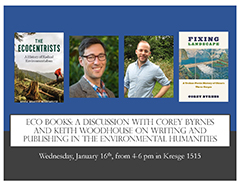 January 16, 2019
January 16, 2019
Corey Byrnes and Keith Woodhouse
Eco Books: A Discussion on Writing and Publishing in the Environmental Humanities
Public Talk: 4:00 - 6:00 pm; Kresge Hall #1515 (Trienens Forum)
Details: Click title link above
Corey Byrnes and Keith Woodhouse, Northwestern University
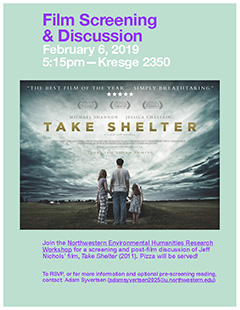 February 6, 2019
February 6, 2019
"Take Shelter" Film Screening and Discussion
5:15pm; Kresge Hall #2350 (Kaplan Institute)
Details: Click title link above
Pizza will be served!
RSVP to Adam Syvertsen (adamsyvertsen2025@u.northwestern.edu)
Pre-screening reading (optional): "'There's a Storm Coming!': Reading the Threat of Climate Change in Jeff Nichols's Take Shelter" by Agnes Woolley.
Fall 2018
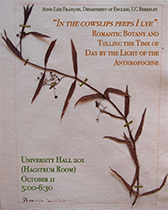 October 11, 2018
October 11, 2018
Anne-Lise François
"In the Cowslips Peeps I Lye:" Romantic Botany and Telling the Time of Day by the Light of the Anthropocene
Public Talk: 5:00 - 6:30pm; University Hall #201 (Hagstrum Room)
Details: Click title link above
Anne-Lise François, Department of English, UC Berkeley
2017-2018 Events
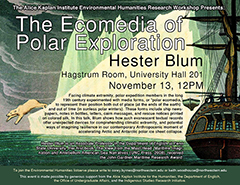 November 13, 2017—The Ecomedia of Polar Exploration
November 13, 2017—The Ecomedia of Polar Exploration
Hester Blum, Department of English, Penn State University
January 19, 2018—The ‘Human' in History and Biology: Questions of Scale, Questions of Value
Julia Adeney Thomas, Department of History, University of Notre Dame
January 29, 2018—Bringing Ecocritical Methods to Sound Media
Jacob Smith, Department of Radio/Television/Film, Northwestern
February 12, 2018—Space of the Gigantic: Extraction and Urbanization in Inner Mongolia
Max Woodworth, Department of Geography and East Asian Studies, Ohio State University
March 5, 2018—Masculinities, Rollin' Coal, and Pollution Porn: Mediating Ecopiety and Its Discontents
Sarah McFarland Taylor, Department of Religious Studies, Northwestern
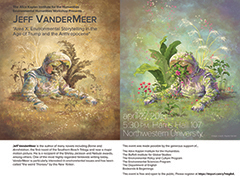 April 27, 2018—Area X: Environmental Storytelling in the Age of Trump and the Anthropocene
April 27, 2018—Area X: Environmental Storytelling in the Age of Trump and the Anthropocene
Jeff VanderMeer, author of Borne and the Southern Reach Trilogy
May 7, 2018—Nature As An Artist in Early Modern Europe
Rebecca Zorach, Department of Art History, Northwestern
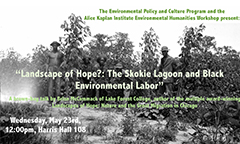 May 23, 2018—Landscape of Hope? The Skokie Lagoons and Black Environmental Labor
May 23, 2018—Landscape of Hope? The Skokie Lagoons and Black Environmental Labor
Brian McCammack, Department of Environmental Studies, Lake Forest College
2016-2017 Events
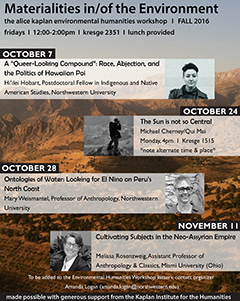 Fall 2016 Events Overview
Fall 2016 Events Overview
October 7, 2016—A "Queer-Looking Compound": Race, Abjection, and the Politics of Hawai‘ian Poi
Hi‘ilei Hobart, Postdoctoral Fellow in Indigenous and Native American Studies, Northwestern
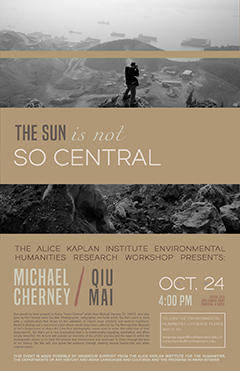 October 24, 2016—The Sun Is Not So Central
October 24, 2016—The Sun Is Not So Central
Michael Cherney, Photographer, Calligrapher and Book Artist
October 28, 2016—Ontologies of Water: Looking for El Nino on Peru's North Coast
Mary Weismantel, Department of Anthropology, Northwestern
November 11, 2016—Cultivating Subjects in the Neo-Assyrian Empire
Melissa Rosenzweig, Departments of Anthropology and Classics, Miami University (Ohio)
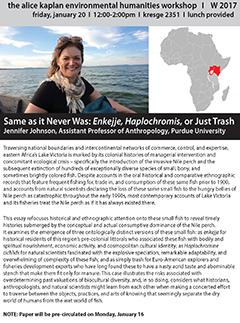 January 20, 2017—Same As It Ever Was: Enkejje, Haplochromis, or Just Trash
January 20, 2017—Same As It Ever Was: Enkejje, Haplochromis, or Just Trash
Jennifer Johnson, Department of Anthropology, Purdue University
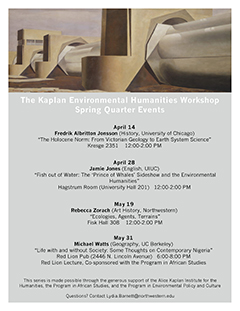 Spring 2017 Events Overview
Spring 2017 Events Overview
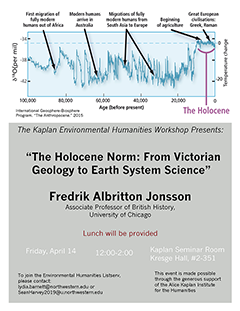 April 14, 2017—The Holocene Norm: From Victorian Geology to Earth System Science
April 14, 2017—The Holocene Norm: From Victorian Geology to Earth System Science
Fredrik Albritton Jonsson, Department of History, University of Chicago
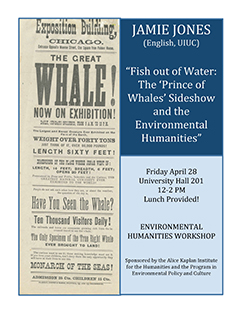 April 28, 2017—Fish Out of Water: The 'Prince of Whales' Sideshow and the Environmental Humanities
April 28, 2017—Fish Out of Water: The 'Prince of Whales' Sideshow and the Environmental Humanities
Jamie Jones, Department of English, University of Illinois at Urbana-Champaign
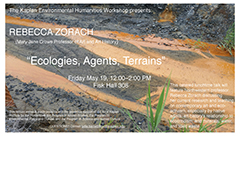 May 19, 2017—Ecologies, Agents, Terrains
May 19, 2017—Ecologies, Agents, Terrains
Rebecca Zorach, Department of Art History, Northwestern
May 31, 2017—Life With and Without Society: Some Thoughts on Contemporary Nigeria
Michael Watts, Department of Geography, University of California-Berkeley
2015-2016 Events
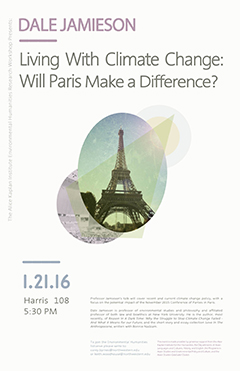 January 21, 2016—Living With Climate Change: Will Paris Make a Difference?
January 21, 2016—Living With Climate Change: Will Paris Make a Difference?
Dale Jamieson, Environmental Studies, Philosophy, Law, and Bioethics, New York University
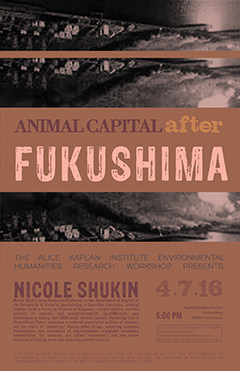 April 7, 2016—Animal Capital After Fukushima
April 7, 2016—Animal Capital After Fukushima
Nicole Shukin, Department of English, University of Victoria
April 20, 2016—History of Entomology (Paper Workshop)
Sheila Wille, Mellon Postdoctoral Fellow in Environmental Humanities, Northwestern
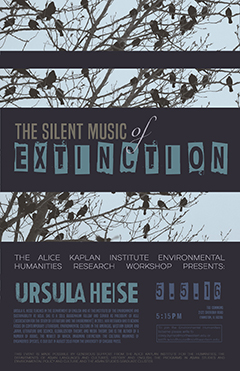 May 5, 2016—The Silent Music of Extinction
May 5, 2016—The Silent Music of Extinction
Ursula Heise, Department of English and the Institute of the Environment & Sustainability, UCLA

